 Moments in History
Moments in History
 3000–1000 BC: Cycladic Civilization
3000–1000 BC: Cycladic Civilization
The early-Bronze Age civilization that existed in the Cyclades before the advent of the Minoans is thought to be the Greek Islands’ earliest civilization. This important period of Mediterranean history is best known for its female icons carved from marble. Its people were believed to be great fishermen.
 700 BC: Creation of the Dorian Hexapolis
700 BC: Creation of the Dorian Hexapolis
Along with the Ionians and the Aeolians, the Dorians were a tribe of ancient Greece and are mentioned in the Odyssey. They created the Dorian Hexapolis, a coalition of six cities, to serve the people and the gods. These were Camirus, Lindus and Lalysos on Rhodes, Cnidus and Halicarnassus in Caria, a region of western Anatolia, and Kos.
 431–404 BC: Peloponnesian War
431–404 BC: Peloponnesian War
A period of unrest between the residents of Corfu, allies of the Athens empire, and their colonizers, the Corinthians, triggered the Peloponnesian War. It was fought between the Athenian and Spartan empires. Harmony with the signing of the Peace of Nicias treaty in 421 BC was short-lived. The Spartans eventually triumphed at the mighty battle at Aegospotami.
 197–146 BC: Roman Invasion
197–146 BC: Roman Invasion
Subjugation by the Romans started in 197 BC and the Roman period began when Corinth was defeated and Greece became part of the Roman Empire in 146 BC. It was a period of change, and Greece, supported by its isles, became the cultural centre of the Roman Empire. Corinth was rebuilt in 46 BC.
 1204–1797: Venetian Occupation
1204–1797: Venetian Occupation

Venetian fortress
The Republic of Venice took control of the Ionians from 1204. This was a key period in the history of the islands – it was due to strong Venetian fortifications that they were able to escape occupation during the Ottoman invasion of Greece. As a result, the islands remained Christian.
 1309–1522: Knights Hospitallers
1309–1522: Knights Hospitallers
Knights Hospitallers, Order of St John of Jerusalem, invaded many islands in the 14th century, particularly those in the Dodecanese. They brought much wealth and built strongholds to protect their cities. Their architectural legacy is most notable in Rhodes. The Knights were overthrown in Rhodes by the Ottomans in 1522.
 Ottoman Rule
Ottoman Rule
There have been several periods of Ottoman rule in the islands, the most notable being in the 14th, 16th, 17th and 19th centuries. For example, the Sultan of the Ottoman Empire, Suleiman the Magnificent, captured islands in the Cyclades and Dodecanese in the 1500s, while Crete fell in the 17th century.
 1814–1864: British Protectorate
1814–1864: British Protectorate

German tanks entering Greece
The Greek Islands came under the protectorate of the British in 1814, and, following the Greek War of Independence waged by revolutionaries from 1821 to 1829, overthrew the last period of rule under the Ottoman Empire. The islands acquired Union with Greece in 1864.
 1941: Axis Occupation
1941: Axis Occupation
During World War II, the Axis alliance, which included Germany and Italy, took control of Greece and, in 1941, many of the islands were ruled by the Italians. In 1943, the Germans evicted the Italians and immediately exerted their power by sending local Jews to their death.
 1953: Major Earthquake
1953: Major Earthquake
The most significant event in modern history was the earthquake that hit the Ionian islands in 1953. This major earthquake, measuring 7.1 on the Richter scale, caused massive damage, destroying many towns. Today, all buildings are built to earthquake-proof standards.